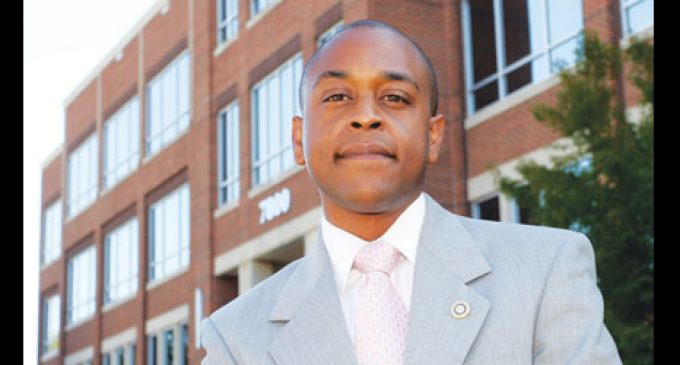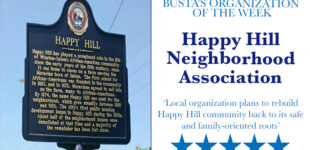Commentary: Venture Winston grants seek to boost start-ups in the city
Algenon Cash

By Algenon Cash
Civic leaders announced the launch of Venture Café Winston-Salem in 2017 and raised capital to support the non-profit’s initial three years of operations. Venture Café’s mission is to broaden, connect and support the innovation community through public spaces and programs to help anyone with an idea succeed. They hope to connect individuals, communities and organizations into one tightly-woven successful innovation ecosystem right here in the Piedmont Triad region.
Originally I criticized the need for Venture Café, but agreed to attend a networking event after constant urging from a personal friend and speaker, Ja’Net Adams. She turned out to be correct – the gathering was not only electrifying, but created a unique safe space for entrepreneurs to connect. Eventually I agreed to serve on Venture Café’s advisory board and participated in countless panel discussions.
The largest motivation that changed my paradigm is Karen Barnes – she has an infectious vision and passion for Winston-Salem that can move mountains. Barnes likes a good hug, but her energy grips you just as strongly and refuses to let go, it’s this very connection that allows her to attract diverse leaders to her cause.
Venture Café provides a global network to Winston-Salem and its Thursday gatherings have been wildly successful in connecting various community members across a diverse spectrum. Through a two-year $200,000 grant from Wexford, Venture Café launched the ACCESS Center for Equity + Success to help minority-owned and women-owned business enterprises access resources, technical support, contract opportunities, and financing. ACCESS provides micro-funding to existing small businesses through a partnership with Piedmont Business Capital.
Barnes declared, “Venture Café is now the heartbeat of the entrepreneurial community and has been instrumental in developing a more collaborative ecosystem.” However, Barnes noticed “gaps beyond the networking events.”
“Now I want to get city leaders to think differently about entrepreneurship and our start-up community,” said Barnes.
Always seeking to “agitate” and “shake-up” things locally, Barnes embarked on a quest to unite the “entrepreneurial ecosystem” with more depth and a hope to make the city a start-up destination. Over the years, Raleigh has emerged as a powerhouse in technology with its development of Research Triangle Park, and Charlotte is now a world renowned banking and financial center.
“What do we want to be?” stated Barnes. “We have to better define the audience and clarify a focus on the future.” However, Barnes is clear that we don’t need to reinvent the wheel, but instead leverage existing assets, but she makes a point not to say “industries.” “We can’t rely on past industries,” said Barnes.
Barnes quickly rattles off a wide range of assets located in Winston-Salem, which could place the community in a unique position to grow the economy, create jobs, and lift stagnant wages. We have an underutilized airport with no commercial traffic, so it provides a rare opportunity to research and develop aviation technology. A well-known medical school opens up the possibility for more healthcare technology. Not to mention we have local assets that create space for us to be innovative players in virtual reality, connectivity and cyber security.
Barnes introduced the Venture Winston grants initiative after discovering a similar program named the Arch Grants, a non-profit organization that provides $50,000 equity-free grants and pro bono support services to entrepreneurs who locate their early-stage businesses in St. Louis. Barnes ultimately hopes the initiative “will do something to distinguish Winston-Salem from other cities” seeking to grow start-ups.
Barnes acknowledges the new initiative would be an “expansion” of Venture Café’s founding mission, but didn’t want to form yet another new entity with a completely new mission and risk more redundancy – which has been a longtime challenge in our small city.
Barnes sought $1.5 million from the City of Winston-Salem to support operations for the new initiative over five years. Undoubtedly, she met quick opposition from elected city officials concerned about sourcing the funds, local inclusion, diversity, retention, and a whole range of additional issues. Barnes, always unrelenting, enlisted the support of multiple public, private and non-profit leaders to win over elected leadership.
David Mounts, president and CEO of Inmar, and Mark Owens, president and CEO of the Winston-Salem Chamber of Commerce, both agreed to partner with Barnes and Venture Café. Mounts brings deep connections in the private sector to aid fundraising and Owens agreed to provide critical infrastructure for the initiative through his far-reaching Chamber of Commerce.
Also worth noting is the newly launched Winston Starts housed in 500 W. Fifth will provide incubator space and support pathways for chosen participants. Barnes is positioning Flywheel to be the final landing place for companies exiting the program.
After much discussion, debate and some negotiation, the Winston-Salem City Council agreed to provide $900,000 to jumpstart Venture Winston Grants – less than Barnes hoped for, but still a win nevertheless. The city inserted some caveats – the Forsyth County Commissioners must also match the city dollar for dollar and the program must raise $1.75 million from the private sector.
The city will source the funds to assist the new program by utilizing incentives that were awarded to Inmar to encourage them to keep their operations in Winston-Salem. Those funds went unused. None of the city money will be awarded to companies, it will be earmarked for operations, and privately raised funds will serve as the backbone for the grants program.
“We are thankful for the city’s support and excited to be a partner in better scaling Venture Café’s efforts and the overall start-up community,” Mark Owens shared. The Chamber has a long history of working alongside the city, deep experience with managing public funds, and knowledge about financial reporting and documentation requirements.
The Chamber also possesses a deep infrastructure that can enable Venture Café to take advantage of administrative staffing, national public relations, and office equipment. In the end, the connectivity to the Chamber will allow Venture Café to stretch public money further, because the organization won’t have to allocate funds to several operating needs.
“We are good at growing companies in Winston-Salem and our track record proves it,” said Owens, “but we need to incubate the next Reynolds or Hanesbrands.”
The actual operating procedures for Venture Winston are still in flux – but generally organizers are closely modeling the initiative after the Arch Grants in St. Louis.
Which means the application process may be three steps:
1. A large selection committee will review first round applicants and select those best fitted for staff review. In St. Louis, they often receive over 7,000 applications and provide only 20 grants. Organizers hope to use a point-based system similar to the city’s procurement criteria to select applicants with local companies; veteran and minority-owned firms will receive a special weighting.
2. Staff will conduct due-diligence on applicants clearing the first hurdle and move the most notable on to a pitch competition.
3. Judges sourced from the community at-large will make the final decisions about which applicants receive a $50,000 grant. The first year may yield 12 grants with a goal to provide 20 grants annually.
Undoubtedly the new initiative will stumble and Barnes, along with others, will learn a lot from the first rounds of grant making, but the new push to recruit and grow start-ups in the city has tremendous potential.
I’ve long argued the city has been stuck in an identity crisis for nearly 20 years and that’s evidenced by the loss of 14 corporate headquarters since 2000 – with no clarity from city leadership on what’s next. Venture Café will not solve the festering issue simply by doling out $50,000 grants, but they may attract a company with great talent and perhaps we figure out a way to retain the company, its founders and workers.
Also the selection committee and community judges must be well balanced, diverse and focused on awarding the companies with the best and brightest ideas, not only the enterprises connected to the good ole’ boy network that has been self-appointed to maintain the gates in town.
Winston-Salem lacks a well-developed capital infrastructure to properly fund late stage companies. So there is a risk the very start-ups that we attempt to incubate may still flee to Boston, Silicon Valley, or all points in between where large private equity funds exist to provide the lifeblood of any growing company. Hopefully, Barnes and others are giving heavy consideration to this important reality.
The Arch Grants in St. Louis have successfully retained 90% of the companies that applied, but no data exist to inform us just how long those companies stayed in the area once the one-year commitment expired. Barnes recognizes there is nothing preventing a company from departing the city once their obligation has been met.
Undeniably we must be laser-focused on creating wraparound services to ensure host companies stay engaged, we need to assist founders with getting immersed in the city’s culture, and proactively work to establish enhanced capital funds that can finance maturing companies that emerge from the initiative.
Algenon Cash is a nationally recognized speaker and the managing director of Wharton Gladden & Company, an investment banking firm. Reach him at acash@algenoncash.com.















